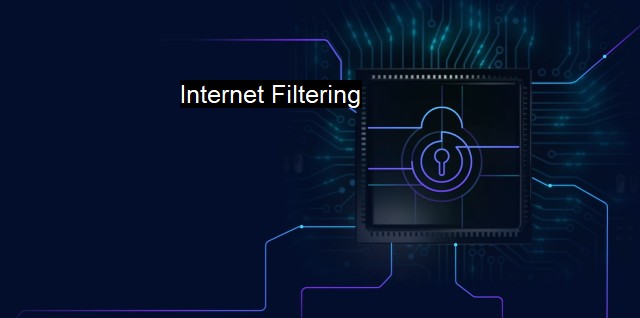What is Internet Filtering?
The Importance of Internet Filtering: Protecting Against Cybercrime and Controlling Inappropriate Content
Internet filtering, with is an integrated defense mechanism designed to decide whether data traffic sent or received is suitable (secure) or potentially harmful. The concept primarily focuses on the act of permitting or blocking access to specific websites, web content, emails, or other internet-based interaction, based on numerous predefined or custom-created criteria.Primarily, this security measure defines the boundary of web browsing, especially for large IT infrastructures like corporations, educational institutions, or government agencies. The idea is to control exposure to potentially corrupt data, to promote security, productivity, compliance with necessary regulations, and a healthy digital environment.
Internet filtering employs various methods to filter content. They include IP filtering, in which a specific IP address or range of IPs is blocked, Port filtering, which blocks specific port numbers, and DNS filtering, prohibiting accesses to certain harmful domain names. Then there is URL filtering that limits access to web pages attached to certain URLs, and Packet filtering, which scrutinizes each data packet sent and isolates potentially harmful packets.
Traditional Internet filters operated on predefined blacklists and traversed no further. the contemporary filters are much more sophisticated. They now utilize semantic, dynamic, dictionary, image, and video filtering to expand their horizon and catch all potentially hostile traffic.
Internet filtering is often a part of the organizational cybersecurity policy in adherence to compliance needs, promoting productivity, limiting legal liability, and ensuring data privacy for the organization as well as its individuals.
From an antivirus perspective, internet filtering aids in creating a shield against malware intrusion. As much as browsers are indispensable, they are also a significant gateway for malicious files to sneak into systems. Recognizing this fact, renowned commercial antivirus services integrate internet filtering into their products to prohibit access to potentially malicious websites and scripts. Several other software tools also offer real-time protection by scanning the downloaded files as part of Internet filtering.
Internet filtering could also act proactively in restricting the downloading or executing of certain file types typically associated with viruses or malware, like .exe files. the filtering software scans emails and their attachments in transit, detecting and blocking any phishing attempts. Various antivirus vendors now offer packages designed specifically for internet filtering, either embedded in the software itself or as a plugin to web browsers.
Although internet filtering significantly improves online safety, it has its fair share of criticisms, predominantly associated with endorsing censorship. There are concerns about the violation of human rights, particularly the freedom of expression and information. In some circumstances, extensive filtering has led to the rise of information control and manipulation, affecting socio-political dynamics.
Despite its criticism, the merit of internet filtering in asset protection mustn't be undermined. Malwares frequently exploit vulnerabilities in unpatched computers or user's unawareness to siphon away crucial information. Here, filters act as both prevention and cure by regulating access to potentially harmful content.
The dynamism of modern threats induces a pertinent need for consistent update and TO&E (Test, Operate and Evolve) of these filters. Apart from designing these filters, organizations should educate their workforce about the plausibility of risks associated with reckless internet browsing and downloading based on fundamental cybersecurity protocols. Considering its widespread implementation, it's apparent that Internet filtering plays a crucial role in maintaining a secure, controlled, and productive digital ecosystem.
Internet filtering involves various methods and tools to minimize security risks to internet users and IT infrastructures alike, providing an advanced layer of cybersecurity. By effectively managing internet access and blocking harmful content, it protects against potential cybertargeting and malware infusion. Therefore, it is a significant topic in the cybersecurity world.

Internet Filtering FAQs
What is internet filtering?
Internet filtering refers to the process of controlling online content available on a particular network or device. This is done to prevent access to certain websites or online material that could potentially harm the system or pose a cybersecurity threat.How does internet filtering work?
Internet filtering works by analyzing the content of online traffic and comparing it to a predefined set of rules or criteria. These rules can be based on the type of content, the source, or the user's location. If the content matches the rules, it is either blocked or allowed to pass through based on the configured settings.Why is internet filtering important for cybersecurity and antivirus?
Internet filtering is important for cybersecurity and antivirus because it helps prevent malicious content from entering the system. By filtering out potentially harmful material, such as malware or phishing websites, the risk of cyberattacks is significantly reduced. Additionally, internet filtering can help enforce security policies and protect sensitive information from being accessed or shared inappropriately.What are the benefits of using internet filtering?
The benefits of using internet filtering include improved cybersecurity, increased productivity, and reduced legal liability. By filtering out potentially harmful or distracting content, employees can focus on their work and avoid wasting time on non-work-related activities. Additionally, internet filtering can help organizations comply with regulations and reduce the risk of legal action for inappropriate online behavior.| | A | | | B | | | C | | | D | | | E | | | F | | | G | | | H | | | I | | | J | | | K | | | L | | | M | |
| | N | | | O | | | P | | | Q | | | R | | | S | | | T | | | U | | | V | | | W | | | X | | | Y | | | Z | |
| | 1 | | | 2 | | | 3 | | | 4 | | | 7 | | | 8 | | |||||||